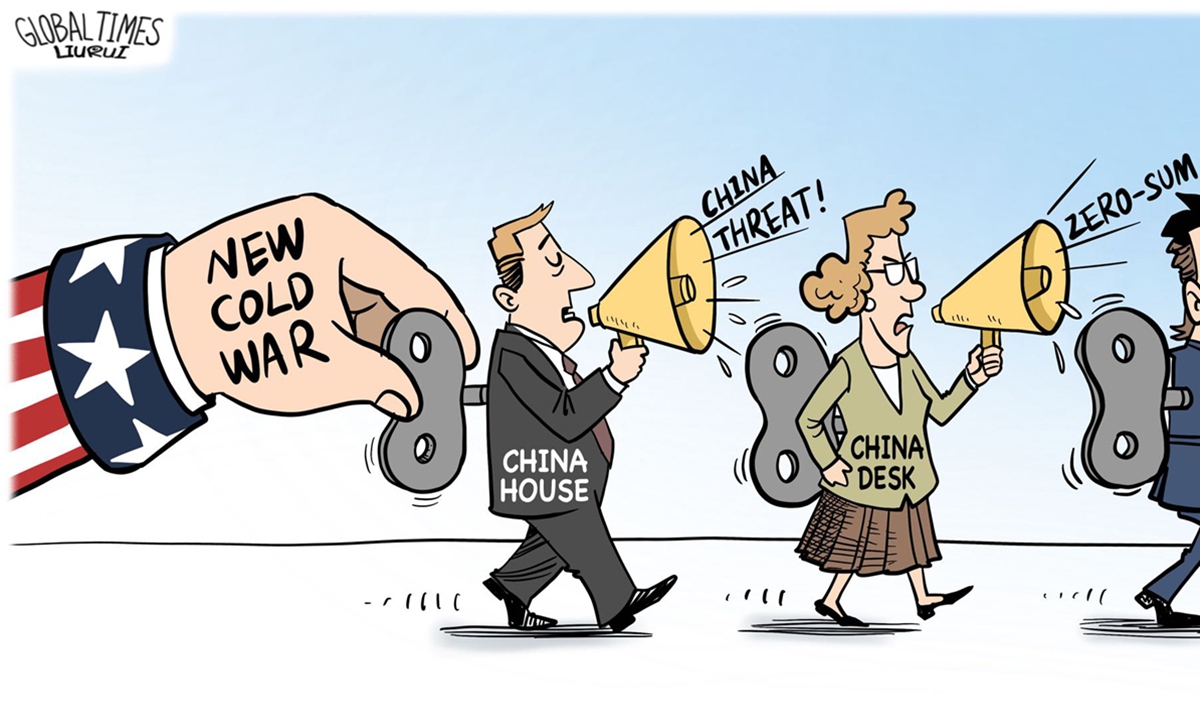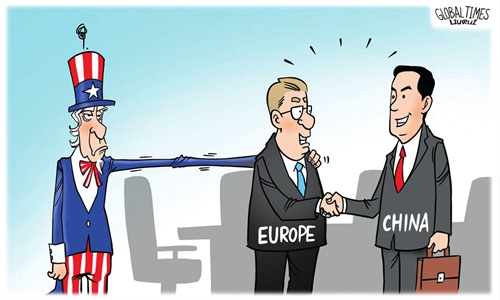US signals to fix China ties but ‘credible sincerity’ needed; Washington to be ‘lone wolf’ in ‘new cold war’ against China

US China new cold war Illustration: Liu Rui/GT
The US "decoupling" and containment strategy against China is in trouble - US media recently found that Washington is getting lonely in its clash with Beijing, as many of its key allies, including France, as well as the US' domestic companies like Intel and Tesla, are reluctant to follow the White House's wrong policy toward China.
The US might become a "lone wolf" in the "new cold war" it launched against China, experts said on Tuesday.
Noticing the US seeks to communicate with China, they stressed it is unlikely Washington will admit its strategy failure or effectively correct its wrong policy after the latest US provocation on the Taiwan question has caused new tension in the region.
Reengagement difficult
The White House recently said the US is working on reengagement with China. US National Security Council Coordinator for Strategic Communications John Kirby said at the White House during a press briefing on Monday that the China-US tensions are certainly high right now.
"We'd like to see this relationship get onto a better footing," and the US is seeking another conversation between the presidents of the two countries, he said.
Responding to US request for communication, Chinese Foreign Ministry spokesperson Wang Wenbin said at a daily routine press conference on Tuesday that "The responsibility for the current difficulties in China-US relations does not lie with China."
"The US needs to stop interfering in China's internal affairs and harming China's interests, and stop undermining the political foundation for our bilateral relations while stressing the need to put 'guardrails' on the relationship. The US needs to work with China to bring the bilateral relations back onto the right track of sound and steady growth," Wang remarked.
The signals released by the White House show that the US wants at least to warm up economic ties with China as the US is caught in the middle of economic and financial difficulties while China has entered economic recovery, Tian Yun, a veteran economist based in Beijing, told the Global Times on Tuesday.
"The US wants to go back to the 'cold politics but hot economy' approach in handling its relations with China," Tian said.
However, to resume economic ties with China, the Biden administration must show credible sincerity with concrete actions.
While asking for talks and visits to China, the US has not stopped its provocation on Taiwan question. The provocative meeting on April 5 between Taiwan regional leader Tsai Ing-wen and US house speaker Kevin McCarthy during Tsai's "transit" in the US prompted the People's Liberation Army to hold a series of drills to respond to the US provocation and deter secessionist forces on the island.
Apart from geopolitical frictions across the Taiwan Straits and in the South China Sea, the US keeps pushing "decoupling" with China in many fields and has coerced its allies and domestic companies to follow suit.
Before US changes its hostility and presents credible sincerity to correct their arrogant policies, meaningful reengagement between China and the US will be difficult, Lü Xiang, an expert on US studies at the Chinese Academy of Social Sciences, told the Global Times on Tuesday.
New cold war fails
"Based on arrogance and racism, Washington's elites refuse to see China's development as an opportunity for cooperation, but perceive it as a 'threat' to the US," Jin Canrong, associate dean of the School of International Studies at the Renmin University of China, told the Global Times on Tuesday.
From Donald Trump era to Joe Biden administration, a series of US policies and actions have already proved that the US has launched a "new cold war" against China, despite its presidents and senior officials refusing to admit the fact, Jin said.
In order to win a cold war, the US needs to mobilize its domestic resources in governmental and private sectors and its allies around the globe to jointly fight its "rivals," but it turns out that Washington is unable to effectively achieve the goal to contain or isolate China, Jin said.
US companies are embracing, not "decoupling" with, China. US carmaker Tesla and chip giant Intel unveiled new business plans in China over the past weekend, serving as fresh examples of US companies' confidence in China.
US media Politico on Monday published an article entitled "The US' lonely clash with China." The article said that "US allies are becoming more vocal in their discomfort with the potential economic pain that could be in store if the Biden administration takes further action to isolate China."
"There are virtually no US allies that are really all-in on the idea of a 'cold war' with China," Eurasia Group President Ian Bremmer said.
After visiting China, French President Emmanuel Macron told media that Europe should steer clear of any potential conflict between the global superpowers, and said that Europe should not follow US policy in the fields like Taiwan question, calling for more independent decision-making that based on the interest of European countries, not that of the US.
US media outlet the Hill said in a Monday article that Biden must reach out to China "before the US-China impasse becomes irreconcilable."
Experts said that among Washington's elites, some have already realized the consequences of the wrong China policy.
Jin said the US will not admit the failure of its "new cold war" any time soon, therefore the struggles will continue, but it will not bring any good for the US. Lü noted that when the US accuses China of being a "wolf-warrior," it seems like the US is making itself a "lone wolf" in its "new cold war" with China.
It is possible to see the US get more and more isolated as it cannot provide certainties to the world but bring only troubles, damaging the supply and industrial chains only to maintain its declining hegemony, the expert said.




